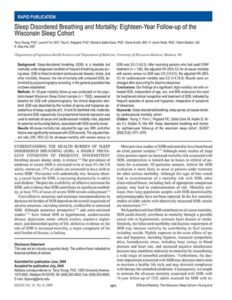
In the field of sleep medicine, the intricate relationship between sleep-disordered breathing (SDB) and mortality has long intrigued researchers. Young et al.’s seminal study, published in the August 2008 issue of Sleep, offers profound insights into this nexus by presenting findings from an extensive 18-year follow-up of the Wisconsin Sleep Cohort. This groundbreaking research elucidates the profound implications of SDB, particularly obstructive sleep apnea (OSA), on long-term health outcomes and mortality risks.
SDB encompasses a spectrum of breathing abnormalities during sleep, with OSA emerging as the most prevalent and clinically significant subtype. Characterized by recurrent episodes of partial or complete upper airway obstruction during sleep, OSA not only disrupts sleep architecture but also imposes systemic physiological strain, predisposing individuals to a myriad of cardiovascular and metabolic sequelae.
Young and colleagues embarked on a longitudinal journey to unravel the long-term ramifications of SDB, meticulously tracking a cohort of participants over nearly two decades. Through comprehensive polysomnography and meticulous data analysis, they unearthed compelling associations between SDB severity and mortality rates, underscoring the profound impact of this sleep disorder on overall health and longevity.
The findings from this landmark study revealed a dose-response relationship between SDB severity and mortality risk, with individuals experiencing moderate to severe SDB exhibiting markedly elevated mortality rates compared to their counterparts with milder forms of the disorder. Furthermore, the study shed light on the role of underlying comorbidities, such as cardiovascular disease and metabolic dysfunction, in mediating the adverse outcomes associated with SDB.
By elucidating the intricate interplay between SDB and mortality, Young et al.’s research serves as a clarion call for heightened vigilance and proactive management of sleep disorders in clinical practice. Moreover, their findings underscore the imperative of integrating sleep assessment and management into broader public health initiatives aimed at reducing the burden of chronic disease and enhancing population health outcomes.





